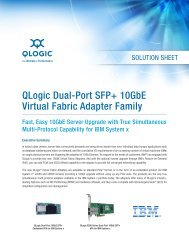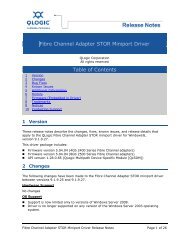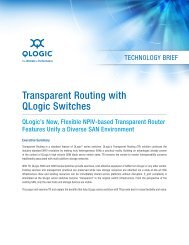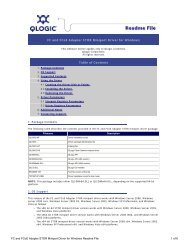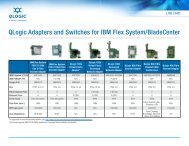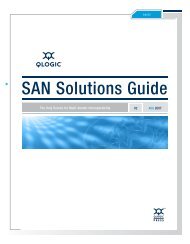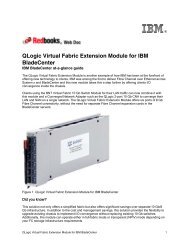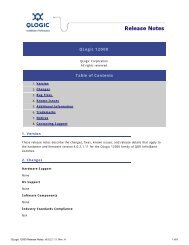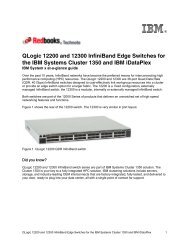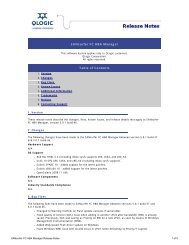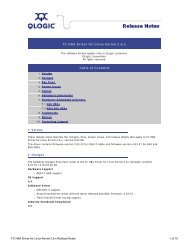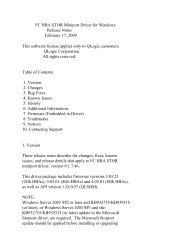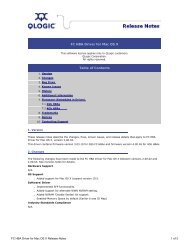- Page 1 and 2:
User Guide Fabric Manager 7.0.1 IB0
- Page 3 and 4:
Table of Contents Preface Intended
- Page 5 and 6:
Fabric Manager 7.0.1 User Guide Fab
- Page 7 and 8:
Fabric Manager 7.0.1 User Guide 4 V
- Page 9 and 10:
Fabric Manager 7.0.1 User Guide D E
- Page 11 and 12:
Preface Intended Audience This manu
- Page 13 and 14:
For details about available service
- Page 15 and 16:
1 Overview of the QLogic Fabric Man
- Page 17 and 18:
1-Overview of the QLogic Fabric Man
- Page 19 and 20:
1-Overview of the QLogic Fabric Man
- Page 21 and 22:
1-Overview of the QLogic Fabric Man
- Page 23 and 24:
1-Overview of the QLogic Fabric Man
- Page 25 and 26:
1-Overview of the QLogic Fabric Man
- Page 27 and 28:
1-Overview of the QLogic Fabric Man
- Page 29 and 30:
2 Advanced Fabric Manager Capabilit
- Page 31 and 32:
2-Advanced Fabric Manager Capabilit
- Page 33 and 34:
2-Advanced Fabric Manager Capabilit
- Page 35 and 36:
2-Advanced Fabric Manager Capabilit
- Page 37 and 38:
2-Advanced Fabric Manager Capabilit
- Page 39 and 40:
2-Advanced Fabric Manager Capabilit
- Page 41 and 42:
2-Advanced Fabric Manager Capabilit
- Page 43 and 44: 2-Advanced Fabric Manager Capabilit
- Page 45 and 46: 2-Advanced Fabric Manager Capabilit
- Page 47 and 48: 2-Advanced Fabric Manager Capabilit
- Page 49 and 50: 2-Advanced Fabric Manager Capabilit
- Page 51 and 52: 2-Advanced Fabric Manager Capabilit
- Page 53 and 54: 2-Advanced Fabric Manager Capabilit
- Page 55 and 56: 2-Advanced Fabric Manager Capabilit
- Page 57 and 58: 2-Advanced Fabric Manager Capabilit
- Page 59 and 60: 2-Advanced Fabric Manager Capabilit
- Page 61 and 62: 2-Advanced Fabric Manager Capabilit
- Page 63 and 64: 2-Advanced Fabric Manager Capabilit
- Page 65 and 66: 2-Advanced Fabric Manager Capabilit
- Page 67 and 68: 2-Advanced Fabric Manager Capabilit
- Page 69 and 70: 2-Advanced Fabric Manager Capabilit
- Page 71 and 72: 3 Fabric Manager Configuration This
- Page 73 and 74: 3-Fabric Manager Configuration Conf
- Page 75 and 76: 3-Fabric Manager Configuration Conf
- Page 77 and 78: 3-Fabric Manager Configuration Conf
- Page 79 and 80: 3-Fabric Manager Configuration Conf
- Page 81 and 82: 3-Fabric Manager Configuration Conf
- Page 83 and 84: 3-Fabric Manager Configuration Conf
- Page 85 and 86: 3-Fabric Manager Configuration Conf
- Page 87 and 88: 3-Fabric Manager Configuration Conf
- Page 89 and 90: 3-Fabric Manager Configuration Conf
- Page 91 and 92: 3-Fabric Manager Configuration Conf
- Page 93: 3-Fabric Manager Configuration Conf
- Page 97 and 98: 3-Fabric Manager Configuration Conf
- Page 99 and 100: 3-Fabric Manager Configuration Conf
- Page 101 and 102: 3-Fabric Manager Configuration Conf
- Page 103 and 104: 3-Fabric Manager Configuration Conf
- Page 105 and 106: 3-Fabric Manager Configuration Conf
- Page 107 and 108: 3-Fabric Manager Configuration Conf
- Page 109 and 110: 3-Fabric Manager Configuration Conf
- Page 111 and 112: 3-Fabric Manager Configuration Conf
- Page 113 and 114: 3-Fabric Manager Configuration Conf
- Page 115 and 116: 3-Fabric Manager Configuration Conf
- Page 117 and 118: 3-Fabric Manager Configuration Conf
- Page 119 and 120: 3-Fabric Manager Configuration Conf
- Page 121 and 122: 3-Fabric Manager Configuration Conf
- Page 123 and 124: 3-Fabric Manager Configuration Conf
- Page 125 and 126: 3-Fabric Manager Configuration Conf
- Page 127 and 128: 3-Fabric Manager Configuration Conf
- Page 129 and 130: 3-Fabric Manager Configuration Conf
- Page 131 and 132: 3-Fabric Manager Configuration Conf
- Page 133 and 134: 3-Fabric Manager Configuration Conf
- Page 135 and 136: 3-Fabric Manager Configuration Conf
- Page 137 and 138: 3-Fabric Manager Configuration Conf
- Page 139 and 140: 3-Fabric Manager Configuration Conf
- Page 141 and 142: 3-Fabric Manager Configuration Conf
- Page 143 and 144: 3-Fabric Manager Configuration Conf
- Page 145 and 146:
4 Virtual Fabrics Overview Virtual
- Page 147 and 148:
4-Virtual Fabrics Configuration Eac
- Page 149 and 150:
4-Virtual Fabrics Configuration Tab
- Page 151 and 152:
4-Virtual Fabrics Configuration The
- Page 153 and 154:
4-Virtual Fabrics Configuration 0
- Page 155 and 156:
4-Virtual Fabrics Configuration All
- Page 157 and 158:
4-Virtual Fabrics Configuration . T
- Page 159 and 160:
4-Virtual Fabrics Configuration The
- Page 161 and 162:
4-Virtual Fabrics Configuration The
- Page 163 and 164:
4-Virtual Fabrics Configuration The
- Page 165 and 166:
4-Virtual Fabrics Configuration Sec
- Page 167 and 168:
4-Virtual Fabrics Configuration Tab
- Page 169 and 170:
4-Virtual Fabrics Configuration The
- Page 171 and 172:
4-Virtual Fabrics Configuration
- Page 173 and 174:
4-Virtual Fabrics Configuration Al
- Page 175 and 176:
5 Embedded Fabric Manager Commands
- Page 177 and 178:
5-Embedded Fabric Manager Commands
- Page 179 and 180:
5-Embedded Fabric Manager Commands
- Page 181 and 182:
5-Embedded Fabric Manager Commands
- Page 183 and 184:
5-Embedded Fabric Manager Commands
- Page 185 and 186:
5-Embedded Fabric Manager Commands
- Page 187 and 188:
5-Embedded Fabric Manager Commands
- Page 189 and 190:
5-Embedded Fabric Manager Commands
- Page 191 and 192:
5-Embedded Fabric Manager Commands
- Page 193 and 194:
5-Embedded Fabric Manager Commands
- Page 195 and 196:
5-Embedded Fabric Manager Commands
- Page 197 and 198:
5-Embedded Fabric Manager Commands
- Page 199 and 200:
5-Embedded Fabric Manager Commands
- Page 201 and 202:
5-Embedded Fabric Manager Commands
- Page 203 and 204:
5-Embedded Fabric Manager Commands
- Page 205 and 206:
5-Embedded Fabric Manager Commands
- Page 207 and 208:
5-Embedded Fabric Manager Commands
- Page 209 and 210:
5-Embedded Fabric Manager Commands
- Page 211 and 212:
5-Embedded Fabric Manager Commands
- Page 213 and 214:
5-Embedded Fabric Manager Commands
- Page 215 and 216:
5-Embedded Fabric Manager Commands
- Page 217 and 218:
5-Embedded Fabric Manager Commands
- Page 219 and 220:
5-Embedded Fabric Manager Commands
- Page 221 and 222:
5-Embedded Fabric Manager Commands
- Page 223 and 224:
5-Embedded Fabric Manager Commands
- Page 225 and 226:
5-Embedded Fabric Manager Commands
- Page 227 and 228:
5-Embedded Fabric Manager Commands
- Page 229 and 230:
5-Embedded Fabric Manager Commands
- Page 231 and 232:
5-Embedded Fabric Manager Commands
- Page 233 and 234:
5-Embedded Fabric Manager Commands
- Page 235 and 236:
5-Embedded Fabric Manager Commands
- Page 237 and 238:
5-Embedded Fabric Manager Commands
- Page 239 and 240:
5-Embedded Fabric Manager Commands
- Page 241 and 242:
5-Embedded Fabric Manager Commands
- Page 243 and 244:
5-Embedded Fabric Manager Commands
- Page 245 and 246:
5-Embedded Fabric Manager Commands
- Page 247 and 248:
5-Embedded Fabric Manager Commands
- Page 249 and 250:
5-Embedded Fabric Manager Commands
- Page 251 and 252:
5-Embedded Fabric Manager Commands
- Page 253 and 254:
6 Installation and Set Up Installin
- Page 255 and 256:
6-Installation and Set Up Installin
- Page 257 and 258:
6-Installation and Set Up Installin
- Page 259 and 260:
A Fabric Manager Command Line Inter
- Page 261 and 262:
A-Fabric Manager Command Line Inter
- Page 263 and 264:
A-Fabric Manager Command Line Inter
- Page 265 and 266:
A-Fabric Manager Command Line Inter
- Page 267 and 268:
A-Fabric Manager Command Line Inter
- Page 269 and 270:
A-Fabric Manager Command Line Inter
- Page 271 and 272:
A-Fabric Manager Command Line Inter
- Page 273 and 274:
A-Fabric Manager Command Line Inter
- Page 275 and 276:
B QLogic Fabric Manager Log Message
- Page 277 and 278:
B-QLogic Fabric Manager Log Message
- Page 279 and 280:
B-QLogic Fabric Manager Log Message
- Page 281 and 282:
B-QLogic Fabric Manager Log Message
- Page 283 and 284:
B-QLogic Fabric Manager Log Message
- Page 285 and 286:
B-QLogic Fabric Manager Log Message
- Page 287 and 288:
B-QLogic Fabric Manager Log Message
- Page 289 and 290:
B-QLogic Fabric Manager Log Message
- Page 291 and 292:
B-QLogic Fabric Manager Log Message
- Page 293 and 294:
B-QLogic Fabric Manager Log Message
- Page 295 and 296:
B-QLogic Fabric Manager Log Message
- Page 297 and 298:
B-QLogic Fabric Manager Log Message
- Page 299 and 300:
B-QLogic Fabric Manager Log Message
- Page 301 and 302:
B-QLogic Fabric Manager Log Message
- Page 303 and 304:
B-QLogic Fabric Manager Log Message
- Page 305 and 306:
B-QLogic Fabric Manager Log Message
- Page 307 and 308:
C Mapping Old Parameters Versions o
- Page 309 and 310:
C-Mapping Old Parameters Old SM Par
- Page 311 and 312:
C-Mapping Old Parameters Old SM Par
- Page 313 and 314:
C-Mapping Old Parameters Old PM Par
- Page 315 and 316:
C-Mapping Old Parameters Old BM Par
- Page 317 and 318:
D QOS Options in a Mesh/Torus vFabr
- Page 319 and 320:
E ./INSTALL Syntax Syntax ./INSTALL
- Page 322:
Corporate Headquarters QLogic Corpo



